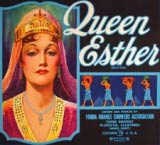March 9, 2009, - 3:49 pm
The Purim Holiday Starts Tonight
By Debbie Schlussel
Tonight, one of my favorite Jewish holidays–Purim–takes place. It lasts a day and goes until tomorrow night.
Purim marks the victory of the Jews against the evil Persian advisor Haman and his decree to destroy the Jews. But more than that, it’s one of the most anti-feminist holidays ever, even though a woman–Queen Esther–is the heroine.
King Xerxes (the king in “300“) gets rid of his queen (legend has it, he beheads her) because she refuses to go to his party and put herself on display for his male partiers. And then he holds a beauty contest for his next queen from all the nations in his kingdom. Not exactly Betty Friedan/Gloria Steinem stuff. And that’s part of why I like this politically incorrect story of Jewish survival.



Purim takes place in ancient Persia, where King Xerxes was “king of the world,” with his kingdom spanning well over 127 nations, from India to Ethiopia. Ironically, we live a modern day Purim, as Iran–modern-day Persia–may now have the complete makings of nukes, and they are, once again as in ancient Persia, aimed at the Jews’ destruction.
It’s kind of a mix of St. Patrick’s Day and Halloween. St. Patrick’s day, because on the holiday of Purim, it’s a good deed to get so drunk you can’t tell the difference between the holiday’s villain, Haman, and one of its heroes, Mordechai. Halloween, because kids on Purim dress up in costume, and because, as part of our observance of Purim, we deliver baskets of goodies to at least two of our friends and also to some poor people on the holiday.
The holiday has a party atmosphere, and as we read the Scroll of Esther (we’re supposed to hear it read two times on the holiday), which tells the story of the Jews’ survival against evil in ancient Persia, we make noises with noisemakers to drown out the name of Haman, the one who wanted to do us in. We’re commanded to have a giant feast on this holiday and it is custom to eat three-cornered, triangular pastries with filling, known as Hamantashen. They’re supposed to look like the pointy ears of the villain, Haman.
Here’s my Debbie’s Notes version of the Purim story, from a previous post on Purim:
King Xerxes I, in the 5th Century B.C., was King of Persia, though he ruled most of the world, as his kingdom consisted of 127 states and provinces. He had a beautiful wife, Vashti, who refused to show up to his big, boozed-up party with the Kingdom’s men. He wanted to show her off, but she didn’t want to leave her own party. He was advised that he should get rid of her (some say she was beheaded), or else all of the wives throughout his kingdom would take it as an example not to obey their husbands. So, Xerxes gets rid of her and held a giant beauty pageant throughout his entire kingdom (the first Miss Universe pageant). Eventually, he chose the the beautiful, Jewish Esther as his queen. Esther hid her Judaism from the king and her uncle, Mordechai, once overheard a plot to kill the king, which he exposed. For that, he was honored by the King.
Haman, the king’s trusted advisor, hated Mordechai because he would not bow down to Haman (he would only bow down to G-d). Haman was henpecked by his ambitious wife, Zeresh, who was kind of like Hillary Clinton and Nancy Pelosi. And he had ten sons who were equally pushy.
Soon, Mordechai found out that Haman wanted to annihilate the entire Jewish population of the world (and hang Mordechai), and he got King Xerxes to sign a decree ordering that. The Jews fasted and mourned over their impending destruction, and Mordechai beseeched Esther to appeal to the King to save the Jews.
One night, Esther approached the King (against protocol because only the King could summon the queen, not vice versa–and she could have been beheaded for this; it wasn’t exactly the days of Hillary Clinton wearing the pants). She invited him to a dinner, where she told him that she was Jewish and of the plans to annihilate her people. King Xerxes was angry when he learned of this and had Haman hung on the gallows prepared for Mordechai. He also agreed to try to stop this and arm the Jewish people so they could respond to the decree for their destruction and live.
The holiday is called Purim because Haman literally conducted a lottery to decide in which month to mass murder the Jews.
The Purim story is a central story of Jewish survival.
While some uneducated Jews believe the Purim story is legend, not only is it very real and an important saga in Jewish history, but the tombs of Queen Esther and her uncle, Mordechai, are tourist sites marketed by the Ahmadinejad government in modern day Hamadan, Iran (pictured above; Esther is called “Khashayarsh,” there).
Yup, gotta love those Iranians–they wanna kill us, but they continue to use our history to make a buck.
From Megillat Esther–the Scroll of Esther:
‘What shall we do unto the queen Vashti according to law, forasmuch as she hath not done the bidding of the king Ahasuerus by the chamberlains?’
And Memucan answered before the king and the princes: ‘Vashti the queen hath not done wrong to the king only, but also to all the princes, and to all the peoples, that are in all the provinces of the king Ahasuerus.
For this deed of the queen will come abroad unto all women, to make their husbands contemptible in their eyes, when it will be said: The king Ahasuerus commanded Vashti the queen to be brought in before him, but she came not.
And this day will the princesses of Persia and Media who have heard of the deed of the queen say the like unto all the king’s princes. So will there arise enough contempt and wrath.
If it please the king, let there go forth a royal commandment from him, and let it be written among the laws of the Persians and the Medes, that it be not altered, that Vashti come no more before king Ahasuerus, and that the king give her royal estate unto another that is better than she.
And when the king’s decree which he shall make shall be published throughout all his kingdom, great though it be, all the wives will give to their husbands honour, both to great and small.’
Then he held the beauty pageant:
After these things, when the wrath of king Ahasuerus was assuaged, he remembered Vashti, and what she had done, and what was decreed against her.
Then said the king’s servants that ministered unto him: ‘Let there be sought for the king young virgins fair to look on;
And let the king appoint officers in all the provinces of his kingdom, that they may gather together all the fair young virgins unto Shushan the castle, to the house of the women, unto the custody of Hegai the king’s chamberlain, keeper of the women; and let their ointments be given them;
And let the maiden that pleaseth the king be queen instead of Vashti.’ And the thing pleased the king; and he did so.
Read the Scroll of Esther in its entirety in English.
And to my Jewish readers, Happy Purim!


One of the nice things about being a jew or a catholic is that getting drunk (sometimes) is allowed. I feel sorry for baptist. I don’t think muslims are permitted to drink either, but I didn’t want to use them in the same sentence as the baptist.
Rick on March 9, 2009 at 4:41 pm